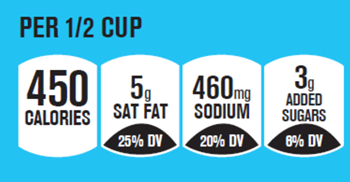By: Krystal Register, MS, RDN, LDN, Senior Director, Health & Well-being, FMI

The intake of added sugars for most Americans is higher than what is recommended by the Dietary Guidelines for Americans, as noted in the National Strategy on Hunger, Nutrition, and Health following the White House Conference. FDA recently hosted a public meeting to explore what the government, the industry and communities are doing to help. FMI was invited to showcase industry-wide strategies, not just around product reformulation and innovation, but with a specific focus on education and community outreach efforts.
Empowering Consumers to Make Healthy Choices
Registered Dietitian Nutritionists (RDNs) work across the food industry sharing evidence-based messaging to empower consumers to include nutritious food and beverage options as they build meals and snacks, in alignment with the Dietary Guidelines to enjoy family meals and an overall healthy pattern of eating.
Retailers use in-store signage, shelf tags and brand specific labeling to help consumers identify choices relevant to their own personal needs and health goals to include low carb and low added sugar. Company websites and apps now have content specific to reducing added sugars, new product information, and specific filters for sugar-specific tags like “no added sugar.” Many retailers and product suppliers have links to informative posts and videos on their websites and social media channels for easy access to quick tips and suggestions on health topics such as added sugar reduction, label reading, recipe ideas and lifestyle guidance.
Promoting Variety and Choice for Consumers

Industry-wide there has been an uptick over the past decade to develop products with no or reduced added sugar to provide variety and choice for consumers. Reformulation is ongoing with many examples of great success with great tasting products that are significantly lower in added sugar, and quite often, RDNs are involved in all steps of product development, innovation, and reformulation.
FMI members are committed to providing variety and choice for consumers across diverse portfolios of products that offer a wide range of sugar content to meet consumer preferences. Many of those products contain no added sugars or small amounts of added sugar, and some use non-nutritive sweeteners, while others are simply packaged in smaller portions. FMI members have noted success with slow, gradual reduction of added sugars which most often results in better consumer acceptance, particularly when paired with education strategies to include and enjoy smaller portions while maintaining an overall healthy pattern of eating.
Focus on Overall Healthy Approach to Eating
Across the entire food industry both grocers and product suppliers are helping consumers learn more about reducing added sugar consumption. As we all think about our own added sugar consumption, it is helpful to look for these expert tips on how to include nutritious choices along with moderate amounts of added sugars as part of a balanced, positive approach to eating and enjoying food, nutrition and health.


 Industry Topics address your specific area of expertise with resources, reports, events and more.
Industry Topics address your specific area of expertise with resources, reports, events and more.
 Our Research covers consumer behavior and retail operation benchmarks so you can make informed business decisions.
Our Research covers consumer behavior and retail operation benchmarks so you can make informed business decisions.
 Events and Education including online and in-person help you advance your food retail career.
Events and Education including online and in-person help you advance your food retail career.
 Food Safety training, resources and guidance that help you create a company food safety culture.
Food Safety training, resources and guidance that help you create a company food safety culture.
 Government Affairs work — federal and state — on the latest food industry policy, regulatory and legislative issues.
Government Affairs work — federal and state — on the latest food industry policy, regulatory and legislative issues.
 Get Involved. From industry awards to newsletters and committees, these resources help you take advantage of your membership.
Get Involved. From industry awards to newsletters and committees, these resources help you take advantage of your membership.
 Best practices, guidance documents, infographics, signage and more for the food industry on the COVID-19 pandemic.
Best practices, guidance documents, infographics, signage and more for the food industry on the COVID-19 pandemic.
